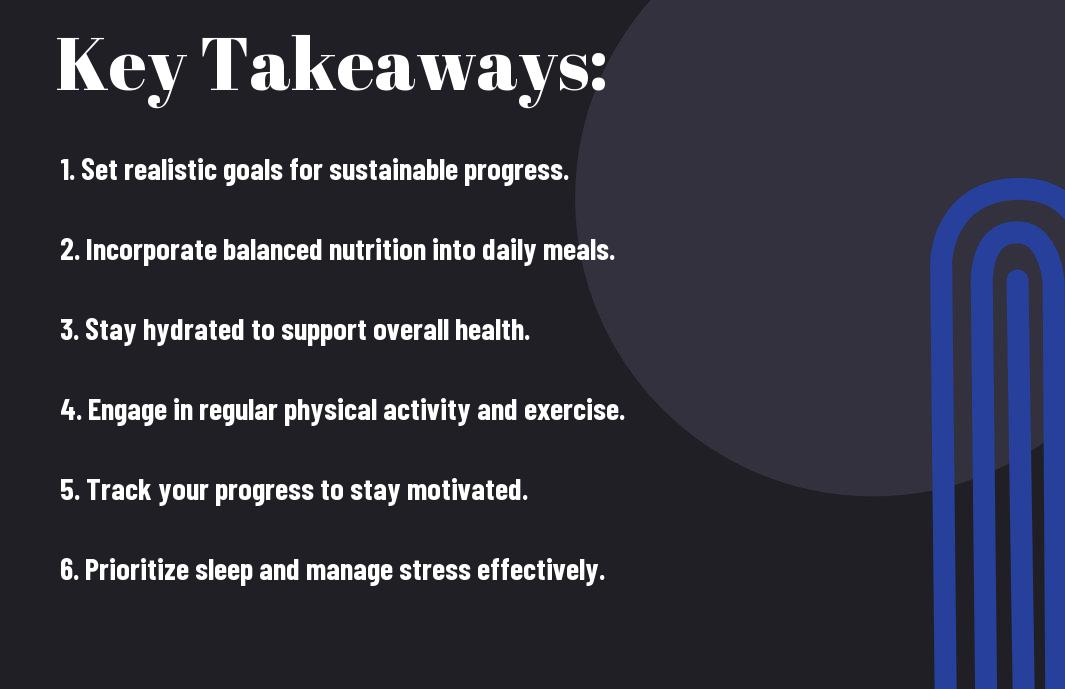You can achieve lasting weight loss by forming healthy habits that fit seamlessly into your daily routine. Understanding the importance of balanced nutrition, regular physical activity, and mindful eating will empower you to make sustainable choices. This blog post will guide you through practical strategies to foster these habits, enabling you to not only lose weight but also maintain a healthier lifestyle for the long term. With the right mindset and actionable tips, you can take control of your weight loss journey and reach your goals effectively.
Key Takeaways:
- Set Realistic Goals: Aim for gradual weight loss, typically 1-2 pounds per week, to ensure sustainability.
- Balanced Nutrition: Focus on incorporating a variety of whole foods including fruits, vegetables, lean proteins, and whole grains.
- Regular Physical Activity: Engage in at least 150 minutes of moderate exercise weekly to boost metabolism and maintain health.
- Mindful Eating: Pay attention to hunger cues and eat without distractions to foster a healthier relationship with food.
- Stay Hydrated: Drink plenty of water throughout the day to support metabolic processes and control appetite.
- Track Progress: Keep a food diary or use apps to monitor eating habits and maintain motivation.
- Seek Support: Engage with friends, family, or support groups to enhance accountability and share experiences.
Understanding Weight Loss
While commenceing on your weight loss journey, it’s crucial to grasp the underlying principles of weight management. Weight loss occurs when you consistently consume fewer calories than your body uses for energy. This balance leads to the utilization of stored fat, resulting in reduced body weight. By familiarizing yourself with these concepts, you set a strong foundation for implementing effective weight loss strategies that suit your lifestyle.
The Science Behind Weight Loss
Loss occurs when the energy you expend exceeds the calories you consume. This fundamental principle, known as the energy balance equation, drives weight loss. Your body requires a certain number of calories for daily functions and physical activities, known as your Total Daily Energy Expenditure (TDEE). To lose weight effectively, you need to create a calorie deficit — either by eating less or increasing your activity level.
Common Myths and Misconceptions
About weight loss, there are numerous myths that can mislead your efforts. Many people believe that you need to eliminate entire food groups or follow fad diets for success. However, sustainable weight loss is about making healthier food choices and practicing moderation, not deprivation. Understanding these misconceptions can help you focus on developing a balanced approach to weight management.
At times, these common myths lead you to believe that losing weight is more complicated than it is. You may have heard that cutting out carbs completely or only eating specific foods will guarantee results. In reality, these extreme approaches can be damaging and unsustainable. Instead, focus on incorporating a variety of nutrient-dense foods into your diet and building healthy habits to achieve lasting weight loss. This mindset shift allows you to enjoy food while still reaching your goals.

Setting Realistic Goals
You need to establish realistic weight loss goals that align with your lifestyle and capabilities. This approach not only enhances your motivation but also fosters a sustainable journey towards healthier habits. By aiming for achievable milestones, you can steadily progress and find joy in your accomplishments. For more insights on this topic, check out Building simple habits for healthy weight loss.
SMART Goal Framework
Beside setting broad objectives, you should apply the SMART framework: Specific, Measurable, Achievable, Relevant, and Time-bound. This method ensures your goals are clear and structured, allowing you to track progress and maintain motivation. For instance, instead of stating “I want to lose weight,” say “I aim to lose 5 pounds in 2 months by exercising three times a week.”
Importance of Individualization
Importance of individualization in your weight loss journey means tailoring goals to fit your unique circumstances, preferences, and challenges. Personalization empowers you to create a plan that resonates with your lifestyle.
The process of individualizing your weight loss strategy involves understanding your current habits, resources, and limitations. For example, consider your work schedule, family commitments, and food preferences. By acknowledging these factors, you can set achievable goals that work specifically for you, making you more likely to adhere to and eventually succeed in reaching your weight loss objectives.
Developing Healthy Eating Habits
To establish a foundation for successful weight loss, you must develop healthy eating habits. This involves prioritizing nutritious foods, planning your meals, and being mindful of portion sizes. By making intentional choices and focusing on whole, unprocessed foods, you can create a sustainable eating pattern that supports your weight loss goals while enhancing your overall well-being.
Nutrition Basics
On a fundamental level, nutrition involves understanding the different food groups and balancing your intake. Incorporate a variety of fruits, vegetables, lean proteins, whole grains, and healthy fats into your diet to ensure you receive important nutrients while keeping your caloric intake in check.
Mindful Eating Practices
Across your journey, practicing mindful eating can significantly enhance your relationship with food. This involves paying attention to your hunger cues, savoring each bite, and eliminating distractions while you eat. By slowing down and focusing on the experience of eating, you can better recognize your body’s signals and improve your overall satisfaction with meals.
The benefits of mindful eating extend beyond weight loss; it fosters a holistic approach to your relationship with food. Engage your senses as you eat—notice the colors, textures, and flavors of each bite. This practice helps you savor your meals, promotes a sense of fulfillment, and ultimately leads to healthier food choices. By adopting mindful eating habits, you can create a more positive and intentional eating experience that supports your weight loss goals.

Incorporating Physical Activity
After establishing a balanced diet, it’s imperative to incorporate physical activity into your daily routine. Regular exercise not only helps you burn calories but also boosts your metabolism, improves your mood, and enhances your overall well-being. Aim for at least 150 minutes of moderate-intensity aerobic activity each week, along with strength training exercises twice a week. It’s important to find ways to stay active that fit seamlessly into your lifestyle, making it easier to form lasting habits.
Benefits of Regular Exercise
With consistent exercise, you can experience improved cardiovascular health, increased strength, and enhanced flexibility. Physical activity also releases endorphins, helping to elevate your mood and reduce stress, making weight loss more sustainable. Furthermore, regular exercise aids in maintaining your weight after you reach your goals, ensuring long-term success in your weight loss journey.
Finding Activities You Enjoy
The key to sustaining an active lifestyle is finding activities that you genuinely enjoy. When you engage in exercises that excite you, it becomes easier to stay committed and make them a regular part of your day. Whether it’s dancing, hiking, swimming, or group sports, incorporating enjoyable activities will help you look forward to your workout sessions.
Hence, explore different types of physical activities until you discover what resonates with you. Consider joining a local sports club, taking a dance class, or even trying yoga. You can also enlist a workout buddy to make the journey more fun and engaging. By prioritizing enjoyment, you’re more likely to stick with your fitness routine and reap the long-term benefits of an active lifestyle.

Building a Support System
Your journey to forming healthy weight loss habits can be significantly enhanced by building a robust support system. Surrounding yourself with encouraging individuals can foster accountability and motivation. Consider exploring the Top 10 Habits That Can Help You Lose Weight for more guidance on fostering a supportive environment for your weight loss journey.
The Role of Community
Between personal accountability and shared experiences, community plays a vital role in your weight loss success. When you connect with others on similar journeys, you cultivate an environment of support where challenges become manageable and victories are celebrated together.
Engaging Friends and Family
Above all, engaging friends and family in your weight loss efforts can provide you with encouragement and practical help. Share your goals with them, invite them to partake in healthy meals, and include them in physical activities. Their involvement can create a positive atmosphere.
It’s beneficial to establish open lines of communication with your friends and family about your weight loss goals. You might consider seeking their involvement in meal prepping or joining workout sessions together. These collaborative efforts not only enhance your commitment but also create shared experiences that strengthen your relationships, while reinforcing your dedication to your health goals.

Overcoming Barriers to Success
Despite your determination, barriers to successful weight loss can arise unexpectedly. Common challenges such as time constraints and lack of support can derail your progress. It’s imperative to address these obstacles proactively. You can explore 15 Healthy Habits for Lasting Weight Loss that can help you navigate these hurdles and create a sustainable path to your goals.
Identifying Challenges
On your weight loss journey, it’s important to identify the challenges that may impede your progress. These could vary from emotional eating to social pressures that encourage unhealthy choices. By acknowledging these barriers, you can create a more tailored approach towards overcoming them, making your weight loss journey more efficient and effective.
Strategies for Staying Motivated
Against the odds of setbacks or plateaus, maintaining your motivation is key to achieving your weight loss goals. You can establish realistic milestones and reward yourself upon reaching them, ensuring that your journey remains rewarding. Surrounding yourself with a supportive community can also bolster your resolve and keep you accountable to your objectives.
Overcoming the fluctuations in motivation requires persistent effort and personal commitment. Engage in activities that inspire you, like joining a fitness class or participating in online forums, where you can connect with others on similar journeys. By cultivating a positive mindset and celebrating your successes, even the small ones, you will reinforce your dedication and align your habits with lasting weight loss.
Conclusion
Following this guide to forming healthy weight loss habits will empower you to take control of your journey. By setting realistic goals, embracing balanced nutrition, and incorporating regular physical activity into your routine, you set the foundation for sustainable weight loss. Cultivating mindfulness in your eating habits, getting adequate sleep, and managing stress are also necessary components. Commit to these practices, and you’ll not only achieve your weight loss goals but also enhance your overall wellbeing and quality of life.
FAQ
Q: What are the first steps to forming healthy weight loss habits?
A: Starting with small, manageable changes is often more effective than attempting drastic transformations. Begin by setting realistic goals, such as incorporating more fruits and vegetables into your meals, drinking plenty of water, and engaging in regular physical activity. Keep track of your progress in a journal or app to stay motivated.
Q: How can I maintain motivation during my weight loss journey?
A: Finding motivation can be strengthened by identifying your personal reasons for wanting to lose weight, whether it’s improving health, boosting self-esteem, or enhancing overall wellbeing. Setting specific, attainable goals, celebrating small milestones, and seeking support from friends or groups can also help sustain your commitment.
Q: What role does nutrition play in forming healthy weight loss habits?
A: Nutrition is fundamental in establishing sustainable weight loss habits. Focusing on whole, nutrient-dense foods such as fruits, vegetables, lean proteins, and whole grains can help provide the necessary energy and nutrients for daily activities while supporting weight loss. Monitoring portion sizes and being mindful of snacking can also aid in managing caloric intake.
Q: How can I overcome cravings for unhealthy foods?
A: Cravings may be managed by identifying triggers and establishing healthier alternatives. Practice mindful eating by savoring each bite of healthier snacks or meals. Keeping healthier options on hand, such as fruits or nuts, can help curb the desire for less nutritious choices. Staying hydrated and ensuring you’re eating balanced meals throughout the day can also reduce cravings.
Q: How often should I exercise in order to form healthy weight loss habits?
A: It is generally recommended to engage in at least 150 to 300 minutes of moderate-intensity aerobic exercise per week for effective weight management. Additionally, incorporating strength training exercises at least twice a week is beneficial for building lean muscle mass, which can elevate your metabolism.
Q: Are there specific lifestyle changes that can support weight loss?
A: Yes, adopting a variety of lifestyle changes can significantly support weight loss efforts. Prioritizing sleep, managing stress levels through relaxation techniques, and maintaining a consistent routine can enhance your overall health and facilitate weight loss. Creating a supportive environment by keeping healthy foods readily available and minimizing temptations can also be beneficial.
Q: How can I track my progress effectively?
A: Tracking progress can be achieved through various methods, including keeping a food diary, using fitness apps to log workouts, and noting physical changes such as measurements, clothing fit, or how you feel overall. Weighing yourself regularly can give a clear picture of your progress, but it is important to acknowledge that fluctuations may occur, and focus on overall trends rather than daily numbers.





